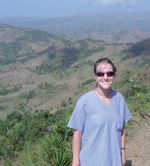|
|

|
Student balances studies, local & global missions
|
by Dawn Brazell
Public Relations
Third-year medical student Katie
Koval has big ambitions. One day she wants to own a dog.
 Katie
Koval enjoys a trek through Haiti. She went there to set up mobile
clinic in the summer of 2007 as part of Family Health Ministries based
in Durham, N.C. Katie
Koval enjoys a trek through Haiti. She went there to set up mobile
clinic in the summer of 2007 as part of Family Health Ministries based
in Durham, N.C.
Koval laughed talking about the goal. It won’t be happening anytime
soon because her days and evenings are filled with activities that
reflect her heart for missions.
The Charleston native is one of eight women at MUSC being honored this
March as part of the National Women’s History Project. The university
solicits nominations for women to be featured during the month of March
who exemplify leadership qualities and who make significant
contributions in their fields.
Koval, who graduated from Duke University in 2006, enrolled in MUSC’s
medical school in 2007. She hit the ground running. Serving as clinic
coordinator last year of MUSC’s CARES Clinic (Community Aid, Relief,
Education and Support), Koval is pursuing her interest in free clinics
and the cause of the uninsured. As she learns more about what other
medical centers are doing, she’s more impressed by CARES, which is a
student-operated medical clinic that provides primary care, mental
health, and physical therapy to the uninsured population in Charleston.
The clinic serves as a wonderful community resource, and it makes
medical students into better doctors by giving them clinical experience
before they enter their practices, she said.
Her interest in helping disadvantaged populations came after a summer
mission trip with her church to Honduras when she was in high school.
“It was an eye-opening experience for me. It was what brought me into
medicine. We saw some horrible things, and I was amazed at the lack of
health care.”
Koval began exploring barriers to health care. In addition to her work
with CARES, she is president of Global and Tropical Medicine Interest
Group (GTMIG). Its purpose is to stimulate interest in global health
through lectures, student interaction, and medical work abroad.
Students discuss the diseases, health disparities, and environmental
health concerns of nations around the world, and applies that knowledge
locally in addressing how to provide health care constrained by limited
resources to the underserved in the Charleston area.
One of her goals is to increase sensitivity among fellow students by
raising awareness of global and local health care needs. She has
learned firsthand about health care barriers from her participation
with the Alliance for Hispanic Health, where she has seen the negative
impact a language barrier can have in access to health care.
“I would have liked to have seen everyone grow up with the health
opportunities that I have had. It’s a basic human need for someone to
have quality health care and that applies whether it’s globally or
locally like the CARES clinic.”
Koval, who also is part of the Presidential Scholars Program this year,
loves working with faculty on local public health projects. One
project involves a needs assessment in a North Charleston community,
evaluating the quality of living and the barriers to health care.
“We’re the worker bees to help them develop this project,” said Koval.
“It’s so neat to apply what you’re learning in class to a local project
and seeing what’s available in your community and what these groups are
doing to change things.”
Her experiences, both with her service projects and interacting with
various community groups, such as Lowcountry AIDS Services, have given
her a sense of empowerment about making change, she said. It gets
tricky at times balancing all her extra-curricular activities and her
studies. When she gets overwhelmed, she goes to get a home-cooked meal
or to play a game with her seven nieces and nephews who live locally.
She also enjoys yoga and listening to music.
The main way the 24-year-old student stays grounded, though, is to remember her calling.
“If I just sat in the library, I would lose why I went into medical
school. I think for everyone in medical school, there’s an intellectual
pull. But what’s even more important for me is the humanitarian pull,”
she said. “Every evening has something going on. It’s an intense
schedule, but I feel such a passion for these things.”
The
National Women’s History Project, founded in 1980, is a non-profit
educational organization committed to recognizing and celebrating the
diverse and significant historical accomplishments of women. The
national theme this year is “Writing Women Back Into History” in honor
of the 30th anniversary of Women’s History Month celebrations. For
information, visit http://www.nwhp.org/whm/index.php.
Friday, March 5, 2010
|
|
|



